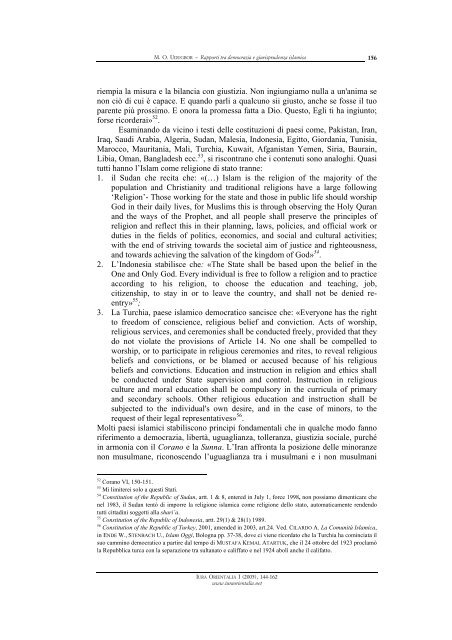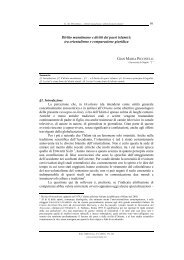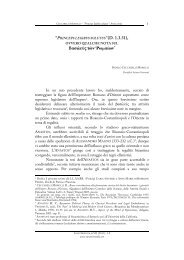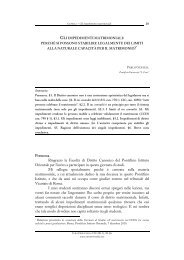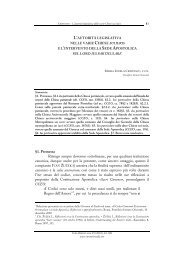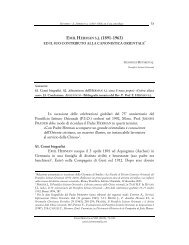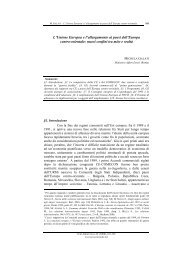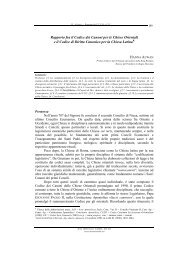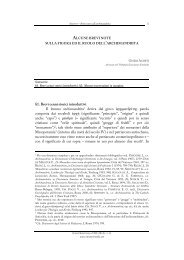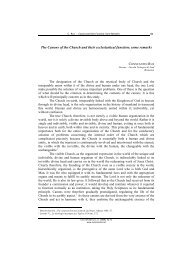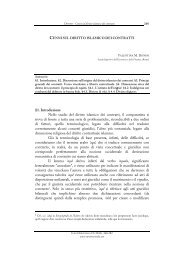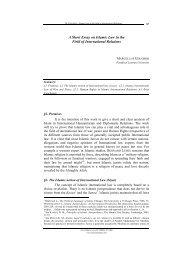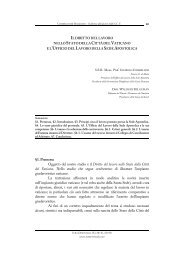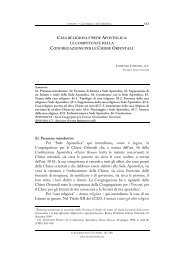M. O. UDUGBOR – Rapporti tra democrazia e giurisprudenza islamica155legge musulmana. Questa Dichiarazione è in linea con la Dichiarazione universaledei <strong>di</strong>ritti del 1948, adottata dall’Assemblea Generale delle Nazioni Unite.Ve<strong>di</strong>amo alcuni riferimenti tra le due <strong>di</strong>chiarazioni e le loro <strong>di</strong>fferenze:⎯ L'art. 3 della Dichiarazione del '48 prevede che «Ogni in<strong>di</strong>viduo ha <strong>di</strong>rittoalla vita, alla libertà ed alla sicurezza della propria persona", mentre l'art. 1della Dichiarazione islamica del 1981, afferma che “La vita è sacra, tranne sela Shari’a consente <strong>di</strong> toglierla».⎯ L'art. 1 della Dichiarazione del 1948 stabilisce che «Tutti gli esseri umaninascono liberi ed uguali in <strong>di</strong>gnità e <strong>di</strong>ritti. Essi sono dotati <strong>di</strong> ragione ecoscienza e devono agire gli uni verso gli altri in spirito <strong>di</strong> fratellanza»,invece l'art. 2 della Dichiarazione Islamica (1981) afferma che «La libertà vagarantita ma va ristretta e limitata nei casi previsti dalla Shari’a».⎯ Gli art. 10 e 11, 1° comma della Dichiarazione del 1948, affermano che:«Ogni in<strong>di</strong>viduo ha <strong>di</strong>ritto, in posizione <strong>di</strong> piena uguaglianza, ad un’equa epubblica u<strong>di</strong>enza davanti ad un tribunale in<strong>di</strong>pendente ed imparziale, al finedella determinazione dei suoi <strong>di</strong>ritti e dei suoi doveri, nonché, dellafondatezza <strong>di</strong> ogni accusa penale che gli sia rivolta» (art. 10) e «Ogniin<strong>di</strong>viduo accusato <strong>di</strong> un reato è presunto innocente sino a che la suacolpevolezza non sia stata provata legalmente in un pubblico processo nelquale egli abbia avuto tutte le garanzie necessarie per la sua <strong>di</strong>fesa» (art. 11).Nell’art. 4 della Dichiarazione Islamica (1981) si legge che «Ogni in<strong>di</strong>viduoha <strong>di</strong>ritto <strong>di</strong> essere processato in base alla Shari’a e ad esigere che essa siaapplicata con esclusione <strong>di</strong> altre leggi».Rimanendo sotto l’aspetto dei <strong>di</strong>ritti fondamentali, ABDULLAHI AN-NAIMammonisce invece che «se la base del <strong>di</strong>ritto islamico moderno non prende <strong>di</strong>stanzada alcune parti del Corano e della Sunna, che risalgono al periodo <strong>di</strong> Me<strong>di</strong>na; checostituirono il fondamento della costruzione della Shari’a, non ci sarà modo perevitare gravi violazioni dei <strong>di</strong>ritti umani. Finché si rimane legati al quadro dellaShari’a, non c'è modo <strong>di</strong> abolire la schiavitù come istituzione giuri<strong>di</strong>ca né <strong>di</strong>eliminare in tutte le loro forme e sfumature le <strong>di</strong>scriminazioni contro le donne e inon musulmani» 51 . NA’IM afferma che molti giuristi islamici contemporanei si<strong>di</strong>ssociano dalle posizioni <strong>di</strong> questi testi, ricordando queste citazioni dal Corano:«vieni, ti parlerò <strong>di</strong> ciò che il tuo Signore ti ha proibito: che tu non associ nulla aLui, e che tu sia buono con i tuoi genitori, e che tu non uccida i tuoi figli a causadella povertà; (…) che tu stia lontano da ogni indecenza esteriore e interiore, e chetu non uccida l'anima che Dio ha proibito, se non per giusto motivo. Questo dunqueti ha ingiunto; forse capirai. E che tu stia lontano dalla proprietà dell'orfano, se nonnella maniera più giusta, finché non abbia raggiunto la maggiore età. E che tu51 AN-NA’IM, Toward an Islamic Reformation: Civil Liberties, Human Rights, and International Law, SyracuseUniversity Press, Syracuse 1990, p. 179. Per rafforzare la tesi sulla <strong>di</strong>scriminazione, specialmente contro le donne,ZECCHINELLI Cecilia ha illustrato nel suo articolo apparso sul Corriere della Sera, il 15 settembre 2004, p. 12,intitolato “offensivo dell’islam sunnita del Cairo contro un progetto <strong>di</strong> legge che avrebbe ostacolato il secondomatrimonio”, che le donne musulmane non sposate cominciano ad essere superfluo. Alcuni come SHEIKH ALIABOU HASSAN, ex-presidente del consiglio della fatwa, raccomandavano agli uomini musulmani <strong>di</strong> prendere piùmogli, ma questa iniziativa è stata contrastata da alcuni riformatori delle leggi islamiche sulla famiglia.FARKAHNDA HASSAN condanna la questione affermando: “la religione musulmana non autorizza il matrimoniopoligamico che rappresenta un’umiliazione per le donne”. FARKAHNDA voleva fa capire che, nonostante che lashari’a riconosce la poligamia fino a 4 mogli, non autorizza un trattamento degradante nei confronti della donna,perché bisogna sempre rispettare le mogli, siano esse le seconde, le terze ecc.IURA ORIENTALIA I (2005), 144-162www.<strong>iura</strong><strong>orientalia</strong>.net
M. O. UDUGBOR – Rapporti tra democrazia e giurisprudenza islamica156riempia la misura e la bilancia con giustizia. Non ingiungiamo nulla a un'anima senon ciò <strong>di</strong> cui è capace. E quando parli a qualcuno sii giusto, anche se fosse il tuoparente più prossimo. E onora la promessa fatta a Dio. Questo, Egli ti ha ingiunto;forse ricorderai» 52 .Esaminando da vicino i testi delle costituzioni <strong>di</strong> paesi come, Pakistan, Iran,Iraq, Sau<strong>di</strong> Arabia, Algeria, Sudan, Malesia, Indonesia, Egitto, Giordania, Tunisia,Marocco, Mauritania, Mali, Turchia, Kuwait, Afganistan Yemen, Siria, Baurain,Libia, Oman, Bangladesh ecc. 53 , si riscontrano che i contenuti sono analoghi. Quasitutti hanno l’Islam come religione <strong>di</strong> stato tranne:1. il Sudan che recita che: «(…) Islam is the religion of the majority of thepopulation and Christianity and tra<strong>di</strong>tional religions have a large following‘Religion’- Those working for the state and those in public life should worshipGod in their daily lives, for Muslims this is through observing the Holy Quranand the ways of the Prophet, and all people shall preserve the principles ofreligion and reflect this in their planning, laws, policies, and official work orduties in the fields of politics, economics, and social and cultural activities;with the end of striving towards the societal aim of justice and righteousness,and towards achieving the salvation of the kingdom of God» 54 .2. L’Indonesia stabilisce che: «The State shall be based upon the belief in theOne and Only God. Every in<strong>di</strong>vidual is free to follow a religion and to practiceaccor<strong>di</strong>ng to his religion, to choose the education and teaching, job,citizenship, to stay in or to leave the country, and shall not be denied reentry»55 ;3. La Turchia, paese islamico democratico sancisce che: «Everyone has the rightto freedom of conscience, religious belief and conviction. Acts of worship,religious services, and ceremonies shall be conducted freely, provided that theydo not violate the provisions of Article 14. No one shall be compelled toworship, or to participate in religious ceremonies and rites, to reveal religiousbeliefs and convictions, or be blamed or accused because of his religiousbeliefs and convictions. Education and instruction in religion and ethics shallbe conducted under State supervision and control. Instruction in religiousculture and moral education shall be compulsory in the curricula of primaryand secondary schools. Other religious education and instruction shall besubjected to the in<strong>di</strong>vidual's own desire, and in the case of minors, to therequest of their legal representatives» 56 .Molti paesi islamici stabiliscono principi fondamentali che in qualche modo fannoriferimento a democrazia, libertà, uguaglianza, tolleranza, giustizia sociale, purchéin armonia con il Corano e la Sunna. L’Iran affronta la posizione delle minoranzenon musulmane, riconoscendo l’uguaglianza tra i musulmani e i non musulmani52 Corano VI, 150-151.53 Mi limiterei solo a questi Stati.54 Constitution of the Republic of Sudan, artt. 1 & 8, entered in July 1, force 1998, non possiamo <strong>di</strong>menticare chenel 1983, il Sudan tentò <strong>di</strong> imporre la religione islamica come religione dello stato, automaticamente rendendotutti citta<strong>di</strong>ni soggetti alla shari’a.55 Constitution of the Republic of Indonesia, artt. 29(1) & 28(1) 1989.56 Constitution of the Republic of Turkey, 2001, amended in 2003, art.24. Ved. CILARDO A. La Comunità Islamica,in ENDE W., STENBACH U., Islam Oggi, Bologna pp. 37-38, dove ci viene ricordato che la Turchia ha cominciata ilsuo cammino democratico a partire dal tempo <strong>di</strong> MUSTAFA KEMAL ATARTUK, che il 24 ottobre del 1923 proclamòla Repubblica turca con la separazione tra sultanato e califfato e nel 1924 abolì anche il califatto.IURA ORIENTALIA I (2005), 144-162www.<strong>iura</strong><strong>orientalia</strong>.net


